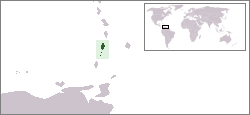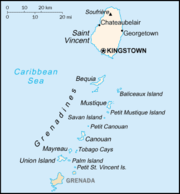Saint Vincent and the Grenadines
|
|
Saint Vincent and the Grenadines is an independent sovereign state of the Caribbean, part of the Commonwealth of Nations.
| |||||
| National motto: Pax et justitia (Latin: Peace and justice) | |||||

| |||||
| Official language | English | ||||
| Capital | Kingstown | ||||
| Queen | Elizabeth II | ||||
| Governor General | Sir Frederick Ballantyne | ||||
| Prime Minister | Ralph Gonsalves | ||||
| Area - Total - % water | Ranked 182nd 389 km? Negligible | ||||
| Population - Total (July 2003 est) - Density | Ranked 176th 116,812 300/km² | ||||
| Sovereignty - Autonomy - Independence | 1969 1979 | ||||
| Currency | East Caribbean dollar | ||||
| Time zone | UTC -4 | ||||
| National anthem | St Vincent Land So Beautiful | ||||
| Internet TLD | .vc | ||||
| Calling Code | 1-784 | ||||
| Contents |
History
Main article: History of Saint Vincent and the Grenadines
Carib Indians aggressively prevented European settlement on St. Vincent until the 18th century. African slaves--whether shipwrecked, escaped from St. Lucia and Grenada and seeking refuge in St. Vincent, or captured by Carib raiders--intermarried with the Caribs and became known as black Caribs. Beginning in 1719, French settlers cultivated coffee, tobacco, indigo, cotton, and sugar on plantations worked by African slaves. In 1763, St. Vincent was ceded to Britain. Restored to French rule in 1779, St. Vincent was regained by the British under the Treaty of Versailles in 1783. Conflict between the British and the black Caribs continued until 1796, when General Sir Ralph Abercromby crushed a revolt fomented by the French radical Victor Hugues. More than 5,000 black Caribs were eventually deported to Roatan, an island off the coast of Honduras.
Slavery was abolished in 1834; the resulting labor shortages on the plantations attracted Portuguese immigrants in the 1840s and east Indians in the 1860s. Conditions remained harsh for both former slaves and immigrant agricultural workers, as depressed world sugar prices kept the economy stagnant until the turn of the century.
From 1763 until independence, St. Vincent passed through various stages of colonial status under the British. A representative assembly was authorized in 1776, Crown Colony government installed in 1877, a legislative council created in 1925, and universal adult suffrage granted in 1951.
During this period, the British made several unsuccessful attempts to affiliate St. Vincent with other Windward Islands in order to govern the region through a unified administration. The most notable was the West Indies Federation, which collapsed in 1962. St. Vincent was granted associate statehood status in 1969, giving it complete control over its internal affairs. Following a referendum in 1979, St. Vincent and the Grenadines became the last of the Windward Islands to gain independence.
Natural disasters have plagued the country throughout the 20th century. In 1902, La Soufriere volcano erupted, killing 2,000 people. Much farmland was damaged, and the economy deteriorated. In April 1979, La Soufriere erupted again. Although no one was killed, thousands had to be evacuated, and there was extensive agricultural damage. In 1980 and 1987, hurricanes devastated banana and coconut plantations; 1998 and 1999 also saw very active hurricane seasons, with hurricane Lenny in 1999 causing extensive damage to the west coast of the island.
Politics
Main article: Politics of Saint Vincent and the Grenadines
St. Vincent and the Grenadines is a parliamentary democracy within the Commonwealth of Nations. Queen Elizabeth II is head of state and is represented on the island by a governor general, an office with mostly ceremonial functions. Control of the government rests with the prime minister and the cabinet.
The country has no formal armed forces, though Royal Saint Vincent and the Grenadines Police Force includes a Special Service Unit.
Saint Vincent and the Grenadines are a full & participating member of the Caribbean Community (CARICOM) and the Organisation of Eastern Caribbean States (OECS).
Parishes
Main article: Parishes of Saint Vincent and the Grenadines
Saint Vincent and the Grenadines is divided into 6 parishes: Charlotte, Grenadines, Saint Andrew, Saint David, Saint George, Saint Patrick
Geography and parishes
Main article: Geography of Saint Vincent and the Grenadines
Economy
Main article: Economy of Saint Vincent and the Grenadines
Agriculture, dominated by banana production, is the most important sector of this lower-middle-income economy. The services sector, based mostly on a growing tourist industry, is also important. The government has been relatively unsuccessful at introducing new industries, and a high unemployment rate of 22% continues. The continuing dependence on a single crop represents the biggest obstacle to the islands' development; tropical storms wiped out substantial portions of crops in both 1994 and 1995. The tourism sector has considerable potential for development over the next decade. Recent growth has been stimulated by strong activity in the construction sector and an improvement in tourism. There is a small manufacturing sector and a small offshore financial sector whose particularly restrictive secrecy laws have caused some international concern.
Demographics
Main article: Demographics of Saint Vincent and the Grenadines
Most Vincentians are the descendants of African slaves brought to the island to work on plantations. There also are a few white descendants of English colonists, as well as some East Indians, Carib Indians, and a sizable minority of mixed race. The country's official language is English, but a French patois may be heard on some of the Grenadine Islands. St. Vincent has a high rate of emigration. With extremely high unemployment and under-employment, population growth remains a major problem..Port_Elizabeth,_Bequia.jpg
Mother_&_children,_Bequia.jpg
Communications
In 1998, Saint Vincent had 20,500 telephones. Its telephone system is islandwide and fully automatic, with VHF/UHF radiotelephone from Saint Vincent to the other islands of the Grenadines and Barbados. It has a new SHF radiotelephone to Grenada and to Saint Lucia; access to Intelsat earth station in Martinique through Saint Lucia
In 1998 it had four radio stations (1 AM, 3 FM). In 1997 it had one television station (plus three repeaters). In 2000 it had 15 ISPs. In 2001 it had 3,500 internet users
Miscellaneous topics
- Foreign relations of Saint Vincent and the Grenadines
- Transportation in Saint Vincent and the Grenadines
References
- Bobrow, Jill & Jinkins, Dana. 1985. St. Vincent and the Grenadines. 4th Edition Revised and Updated, Concepts Publishing Co., Waitsfield, Vermont, 1993.
- Gonsalves, Ralph E. 1994. History and the Future: A Caribbean Perspective. Quik-Print, Kingstown, St. Vincent.
- Williams, Eric. 1964. British Historians and the West Indies, Port-of-Spain.
- CIA Factbook entry (http://www.cia.gov/cia/publications/factbook/geos/vc.html)
- US Dept of State Profile (http://www.state.gov/r/pa/ei/bgn/2345.htm)
| Countries in West Indies |
|---|
|
Antigua and Barbuda | Bahamas | Barbados | Cuba | Dominica | Dominican Republic | Grenada | Haiti | Jamaica | Saint Kitts and Nevis | Saint Lucia | Saint Vincent and the Grenadines | Trinidad and Tobago |
|
Dependencies: Anguilla | Aruba | British Virgin Islands | Cayman Islands | Guadeloupe | Martinique | Montserrat | Navassa Island | Netherlands Antilles | Puerto Rico | Turks and Caicos Islands | U.S. Virgin Islands |
| | Missing image Caricom-Flag.png Flag of the Caribbean Community |
|---|---|
| Antigua and Barbuda | Bahamas¹ | Barbados | Belize | Dominica | Grenada | Guyana | Haiti | Jamaica | Montserrat | Saint Kitts and Nevis | Saint Lucia | Saint Vincent and the Grenadines | Suriname | Trinidad and Tobago | |
| Associate members: Anguilla | Bermuda | Cayman Islands | British Virgin Islands | Turks and Caicos Islands | |
| Observer status: Aruba | Colombia | Dominican Republic | Mexico | Netherlands Antilles | Puerto Rico | Venezuela | |
| ¹ member of the community but not the Caribbean (CARICOM) Single Market and Economy. | edit (https://academickids.com:443/encyclopedia/index.php?title=Template:Caricom&action=edit)
|



